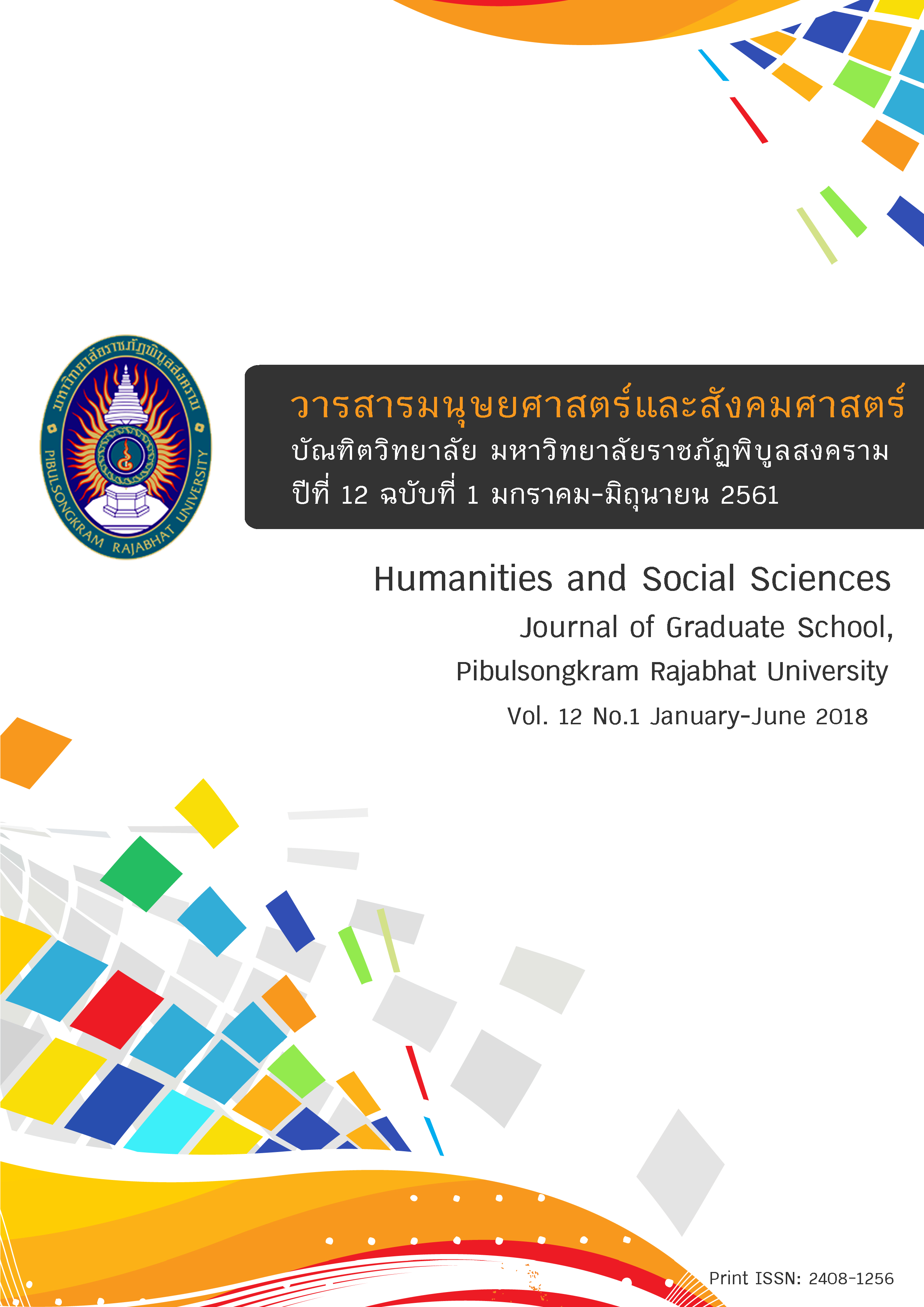Power of Faith and Belief on the Tradition of Pak Nam Pho Shrine: The Golden Dragon
Keywords:
Power of faith and belief, Tradition of Pak Nam pho Shrine, The Golden DragonAbstract
This research is qualitative research to study the power of faith and belief on the tradition of Pak Nam Pho Shrine. Data were collected by in-depth interviews with two groups, namely the first group of 5 people who had the expertise and direct experience as control and trainer. The second group are10 important players in the Golden Dragon Corps. The results found that faith has been passed down from generation to generation for more than 100 years. Faith is the process of creating a dragon and style show. The gathering with love and faith in the golden dragon. Of the more than 200 Poetic descendants and found that the power of faith, which is the subject of the faithful worship of the gods, the sacred worship is the ceremony of cutting the pillars, pillars, dragon pillars. Golden Dragon Eradication Ceremony Burial ceremony and the ceremony to invite God. These beliefs have been passed down from generation to generation for a long time. And the Chinese believe that the Golden Dragon is a symbol of fortune, abundance Prosperity, wisdom and goodness so the people of Pak Nam Pho consider a golden dragon as a sacred animal. If you see or pass the house, who is blessed by the gods, then bring the golden dragon to participate in the procession for the people to pay homage to the blessings in life.
References
นรินทร์ คำนวณสวัสดิ์. (2553). ความเชื่อเรื่องล่าผีฟ้าของชุมชนตำบลคำแมด อำเภอซำสูง จังหวัดขอนแก่น. (วิทยานิพนธ์รัฐประศาสนศาสตรมหาบัณฑิต). มหาวิทยาลัยขอนแก่น, ขอนแก่น.
เรือนแก้ว ภัทรานุประวัติ. (2554). การสืบทอดความเป็นจีน (ผ่านการทำความเข้าใจในความหมายและสัญญลักษณ์ทางศาสนา) ของคนจีนสู่ลูกหลานในสังคมไทย. กรุงเทพฯ: บัณฑิตวิทยาลัย มหาวิทยาลัยหอการค้าไทย.
สุชาติ ประสิทธิ์รัฐสินธุ์. (2547). วิทยาการวิจัยเชิงคุณภาพ การวิจัยปัญหาปัจจุบันและการวิจัยอนาคตกาล. กรุงเทพฯ: สามลดา.
สุชาติ แสงทอง, สุภาวรรณ วงค์คำจันทร์, ทัศนีพร วิศาลสุวรรณกร, และพงษ์ศักดิ์ ศิริโสม. (2559). 100 ปี วิถีปากน้ำโพ ประวัติศาสตร์ความเป็นมาของจังหวัดนครสวรรค์. ปัตตานี: สถาบันวัฒนธรรมศึกษากัลยาณิวัฒนา มหาวิทยาลัยสงขลานครินทร์ วิทยาเขตปัตตานี.
สุภางค์ จันทวานิช. (2547). วิธีวิจัยเชิงคุณภาพ. กรุงเทพฯ: จุฬาลงกรณ์มหาวิทยาลัย.
สุรชัย วิสุธากุล. (2559). ศตวรรษแห่งศรัทธาตรุษจีน 100 ปี สืบสารประเพณีแห่จ้าวพ่อ–จ้าวแม่ปากน้ำโพ. นครสวรรค์: วิสุทธิ์การพิมพ์.
สุรพงษ์ โสธนะเสถียร. (2545). หลักและทฤษฎีการวิจัยทางสังคมศาสตร์. กรุงเทพฯ: ประสิทธิ์ภัณฑ์แอนด์พรินติ้ง.
เสรี ซาเหลา. (2545). กลุ่มชาติพันธ์วัฒนธรรมและประเพณีจังหวัดนครสวรรค์ ชนกลุ่มน้อยไทย. นครสวรรค์: สวรรค์วิถีการพิมพ์.
แสงอรุณ กนกพงศ์ชัย. (2550). วิถีจีน-ไทยในสังคมสยาม. กรุงเทพฯ: มติชน.
อรุณ รักธรรม และณรงค์ กุลนิเทศ. (2552). เอกสารประกอบคำบรรยายการวิจัยเชิงคุณภาพ. โครงการ
ปรัชญาบัณฑิตการบริหารการพัฒนา. กรุงเทพฯ: มหาวิทยาลัยราชภัฏสวนสุนันทา.
การสัมภาษณ์คณะมังกรทองจ้าวพ่อจ้าวแม่ปากน้ำโพ ประกอบด้วย
1.สุรชัย วิสุทธากุล (ป๋าค่าย) เมื่อวันที่ 21 ธันวาคม 2559
2.เล็ก ขจรกสิรัตน์ (ป๋าเล็ก) เมื่อวันที่ 21 และ 23 ธันวาคม 2559
3.ธนศักดิ์ ชื่นภิรมย์ (พี่พุด) เมื่อวันที่ 23 ธันวาคม 2559 และวันที่ 16 กุมภาพันธ์ 2560
4.พชรพล วิสุทธากุล (พี่เก๋า) เมื่อวันที่ 18 มกราคม 2560
5.จตุพงษ์ อินชู เมื่อวันที่ 16 กุมภาพันธ์ 2560
6.พี่เป้ เมื่อวันที่ 18 มกราคม 2560
7.น้องนิว เมื่อวันที่ 17 มกราคม 2560
8.น้องภูมิ เมื่อวันที่ 17 มกราคม 2560
9.พี่แซม เมื่อวันที่ 20 มกราคม 2560
Downloads
Published
How to Cite
Issue
Section
License
Any articles or comments appearing in the Journal of Humanities and Social Sciences, Rajabhat Phibulsongkram University, are the intellectual property of the authors, and do not necessarily reflect the views of the editorial board. Published articles are copyrighted by the Journal of Humanities and Social Sciences, Rajabhat Phibulsongkram University.









